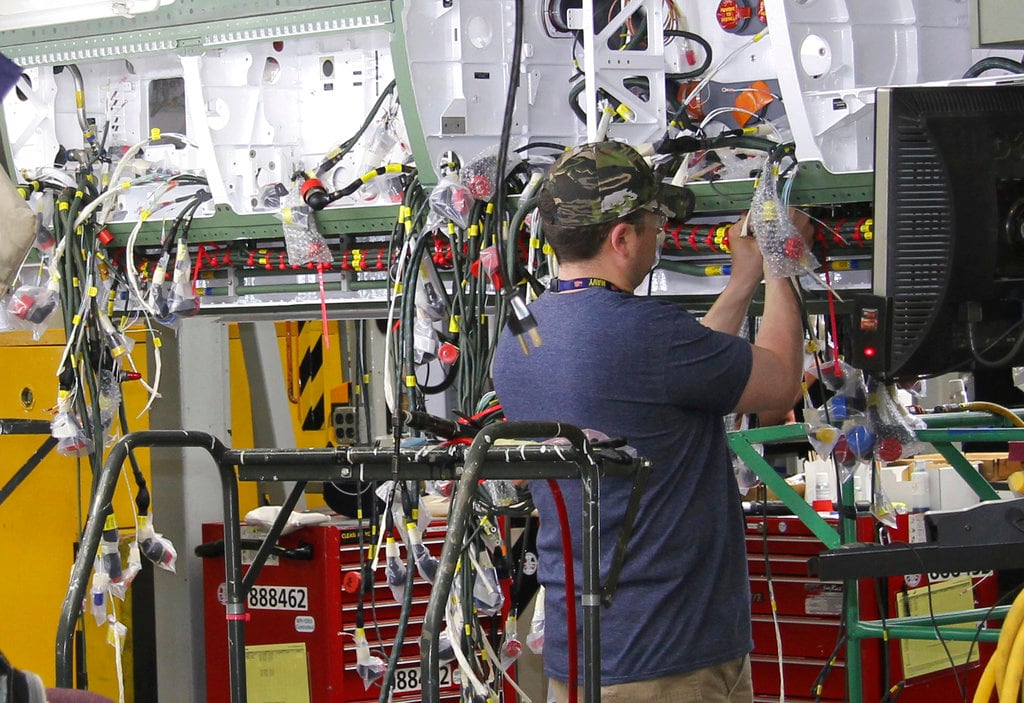WASHINGTON ― Defense trade groups, seeking to sway Congress to add more for defense in a continuing resolution, say record-high inflation is costing the Pentagon $6 billion per month, endangering military readiness and throwing tech development plans off course.
The Aerospace Industries Association, National Defense Industrial Association and Professional Services Council ― which represent thousands of defense contractors ― asked congressional appropriators in a letter Monday to factor inflation into the CR and add money to allow new programs to start.
Congress is on track to pass a continuing resolution that would, unless language is included to stipulate otherwise, continue the previous year’s funding levels and not allow new programs to start. Though the stopgap bill would avert a government shutdown at the end of the fiscal year, Sept. 30, it’s not yet clear how long the emerging bill would last.
A CR at last year’s funding levels would force the military to run at a 9% deficit from the funding level required to maintain its buying power, the trade groups said in the letter. They asked that lawmakers write exceptions into the bill, known as anomalies, that would allow new defense programs to start.
“Companies continue to work through supply chain disruptions, workforce challenges, and munitions shortages,” the letter reads. “They should not be required to work through avoidable budget disruptions. We recommend Congress allow new starts and quantity increases where bipartisan support exists. Industry and the Department of Defense need to be allowed to meet requirements and respond to threats.”
The letter also urges Congress to expedite full-year defense appropriations for fiscal 2023
The groups offer strong support for a provision that would direct the undersecretary of defense for acquisition and sustainment, Bill LaPlante, to adjust contracts based on inflationary impacts. Last week, LaPlante’s office issued new guidance to contracting officers along these lines, but trade groups are seeking broad latitude from Congress, which they say will save businesses and protect the defense industrial base.
“Companies are being critically harmed, and it may not be sustainable for smaller companies to remain in the defense ecosystem,” the letter reads. “The disruptions from inflation are far more significant than just the temporary funding measures. We must not disincentivize companies from working with the government if we want a competitive marketplace.”
RELATED

On Tuesday, NDIA issued a report estimating the dire consequences of inflation on the Defense Department and its suppliers. The report says the Pentagon would lose $110 billion in buying power from 2021 through 2023, which would manifest as “maintenance backlogs, lower readiness ratings, delays in modernization efforts, cost overruns in weapon and construction programs, and further disruptions to recruiting and retention.”
Because the Biden administration’s 2023 budget request underestimated inflation by roughly two percentage points, NDIA recommends Congress add at least $42 billion above the request for 2023, for a budget of $815 billion.
Congress hasn’t finalized defense spending for fiscal 2023, but the defense policy bills passed by the House and Senate would authorize more than $840 billion for national security programs, which includes the Pentagon and Energy Department nuclear programs.
NDIA, echoing the tri-association letter, also recommends Congress direct defense contract prices be adjusted for inflation. It also calls for Congress to have the Pentagon track and report data about the enduring impacts of the recent inflation spike and revise the Pentagon’s fuel working capital fund so it can better handle future price shocks.
NDIA CEO and President David Norquist, the former deputy defense secretary, authored the report with former Air Force undersecretary Lisa Disbrow and the former director of DoD’s Cost Assessment and Program Evaluation office, John Whitley.
“Decisive action now is essential,” Norquist said in a statement. “The cost of failing to act now will be felt across the length and breadth of the DoD and defense industrial base for years to come.”
Dan Grazier, a defense expert at the Project on Government Oversight, said the armed services’ problems persist even at record-high defense spending levels and are unlikely to be fixed with money alone.
“Pentagon leaders need to fundamentally change the way they do business by making more realistic decisions about the weapons they buy,” Grazier said. “If the services keep spending money on programs of dubious technological feasibility that depend on contractor support, they will never get out in front of any of the problems the NDIA predicts.”
Joe Gould was the senior Pentagon reporter for Defense News, covering the intersection of national security policy, politics and the defense industry. He had previously served as Congress reporter.





